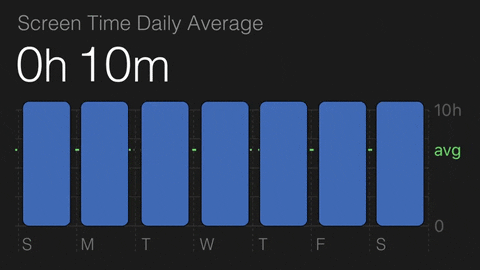Helping our kids balance their screen-filled lives is one of the biggest challenges of our parenting generation. Digital parenting requires us to nurture a skill set that is not inherited or intuitive. It takes our own willingness to learn and understand this new world. As a result, the limit setting, safety monitoring, and boundary defense required to proactively manage our children’s devices throws more parenting “work” squarely in our laps.
But that was 2019, when digital parenting was hard. Today, is it even possible?
Our kids are now required to spend hundreds of educational hours on screens. We don’t have access to the sports, playdates, music classes, sleep-overs, and other activities that naturally created some life balance. Meanwhile, WFH madness, financial issues, health concerns… Let’s be honest. Our kids’ favorite apps, games, and personalized streaming services have been a welcomed ally during our days at home. If nothing else, screens have helped to distract and entertain while we have been trying to keep some semblance of normalcy in our upside down lives.
In the virtual ed, WFH, socially distanced, economically strained, and emotionally stretched world in which we are all living; “screen time,” as we have known it, has been functionally blown to bits.
All my KC patient families know I believe in screen time boundaries, value the screen-free sanctity of the dinner table and bedroom, and encourage delaying smartphone introduction. Even in these Pandemic days, I still believe those things are important. But my screen-time message to families has been massaged for the moment.
Here’s some advice while bedrooms are school rooms, the dinner table is an office, and FaceTime is a lifeline to the people we love.
Reverse the mantra. Rather than focusing on limiting screen time, let’s actively protect human time. These are the areas of life you can control and are fundamental to making successful humans. We can make sure our kids get to bed on time. We can provide three healthy meals. We can spend a few moments eye-to-eye with our kids, chatting about the day and preparing for the next. We can let them know they are loved. If we can prioritize these basics, then we can let screen time fall into the remaining cracks of the day.
Practice daily check-ins to let kids know the map of the day and where screens will fit in. Screen time is fun and something kids look forward to. Create this anticipation by specifically defining when entertainment screen time will be allowed that day. A daily check sets expectation, encourages better focus on other tasks, and lessens the worry or anxiety that “missing” this fun time might create.
Short breaks should be screen-free. Every virtual day includes break times. Encourage these blocks to be screen-free moments. Ask your kids to stand up, walk around the house, use the restroom, or feel the sun. These few minutes are important for posture, eye health and mental resets during extended Zoom-time.
Keep the entertainment in a common place. Using parental controls and monitoring tools is always recommended, but these tools may not be accessible on school-issued devices or too restrictive for educational work. As an alternative, consider “gating” entertainment screen time to common household rooms. If kids know you could be watching or listening, they are much less likely to interact in undesired places. Plus, with the iPad and tablets close by, it’s easier to co-view and join in. (Read Ninja’s message for parents in this NYT piece.)
Quality. Quality. Quality. If you know that your day is going to require more screen time, set them up with some good quality options for recreational viewing and new apps that flex connection and creativity. Here’s a great list from Common Sense Media.
Learn how to transition. When kids have been on screens for awhile, especially when gaming, their brain slowly creeps into the digital world where they are playing. (That’s why these games are so fun, right?) This is the neurological reason why they “don’t hear you” or ignore your yelling when they are on their devices. Their brain focus is literally not on this planet. If you understand this phenomenon, it makes sense why kids get upset when asked to abruptly turn off devices. It feels like they are getting ripped from one world to the next.
Find ways to help kids transition back to real life. Older kids may be able to do this on their own with timers that provide a 5-minute warning before play needs to be over. For younger kids, approach them with verbal context clues to pull their brain’s attention away. For example, ask a question about the game they are playing or what they are watching. Sit with them and chat for 2-3 minutes about the game play. This pulls their attention to you, gently moving their brain from the virtual space and back into reality. By walking through this transition with them, kids will be less likely to fight or argue when screen time is up.
Ask, don’t attack. Mistakes will happen. Rabbit holes will be explored. Curiosity will win. If you find your child in an online space that concerns you, ask questions first. Many times there is a logical reason why kids end up in the online space they do. The more you understand, the more effective your redirection will be.
How did you get here?
What are you learning?
Tell me about the people you are talking to.
That language is upsetting, why are you still here?
How did you learn about this site?
Tell me why you love this game.
Can I show you another place that I might look?
Do you want to know more about this?
Screens can be lifelines. Screens are often the first thing we villainize when things are going wrong. Right now, however, there are lots of things that could be causing kids to have school stress, behavior change, emotional outbursts, weight gain, or [insert problem here]. Screens may or may not be contributory to the problem you are seeing. In fact, online connections may be the only place that a kid may be getting the positive contact they need right now. Broaden your view beyond the screens when you are troubleshooting changes, or consider reaching out for help from your pediatrician if your child needs help.
Prepare for change. Academic learning will not be the same going forward. Digital learning is now enmeshed in schools and we won’t be going back. Keep in mind, there is a large sector of kids that are thriving in virtual learning environments. Although we all anticipate a more “normal” school year in the fall, we can all help this movement into digital learning. Try your best to learn the digital tools your school is offering, expect change, and offer constructive feedback. The more your school can understand how your child is learning on these platforms, the better the experience will be for future students.
My bottom line? Successful digital parenting requires a sense of security, comfort, and productivity that transcends our parenting experience. If you are in a life space that is disrupted and uncertain, a brief release of the “screen time rules” may be exactly what you need to strengthen yourself as a leader of your home and to prepare for the future. On those days, trust in the digital citizenship kids have been taught, leverage their innate resiliency, and have faith that they will be alright. Then when you are able to re-engage with all aspects of your children’s lives, you can do so completely.
I had the opportunity to speak about “How Screen Time Shapes Kids” with Megna Chakrabarti on NPR’s On Point. We were joined by Anya Kamenetz, a well-known NPR education contributor and author of The Art of Screen Time, a book I highly recommend to my patient families.
Our conversation was recorded on Jan 28, 2021. You can listen to it here. (If for nothing else, listen to Quinn and her “cute puppies” comment at minute 40:52, just to make your heart happy.)
I’d love to know how your family is navigating Pandemic screens. Have a tip that might help someone else? Add your comment below or reply to this letter. And, if this was helpful, I’d appreciate it if you’d hit the heart and share with a friend.
Double mask and #runitback,







Thank you for sending this right when I needed it most. Managing screen time is difficult and something I continue to believe is (one of) my #parentingfail. Your bottom line made my heart smile.